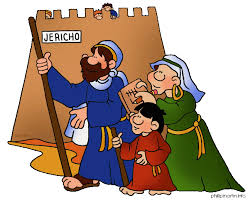Joshua 12:1 – Now these are the kings of the land whom the people of Israel defeated and took possession of their land beyond the Jordan toward the sunrise, from the Valley of the Arnon to Mount Hermon, with all the Arabah eastward:
Thus far, we have seen how Israel crossed the Jordan and with the Lord's help conquered Jericho, Ai, the southern alliance and the northern confederacy. These detailed battles give us insight into the way God moved on behalf of his people.

In the battle of Jericho, we found that the miraculous hand of God was very prevalent. God went before his people and did things they could not do. In these cases, Israel's army had a 'lesser' role in the victory, although they were still actively involved in the outcome.
In the battle of Ai, we find the opposite. The labor of Israel is more prominent; God either chooses not to use miraculous intervention or his intervention is hidden from view. However, this does not mean that Israel stood alone. We know she was assisted by God at every step, even though there were times when her army had a more traditional role in the conquest of an enemy.
From the deception of the Gibeonites we learned that God's people must always consult him before engaging the enemy. When we try to take the lead without him, it normally results in a mess, which God must fix!
The defeat of the southern five-king alliance shows us that no matter how strong, powerful, well connected, well funded or untouchable our enemies may seem, they are no match for God!
The defeat of the northern confederacy, which consisted of 31 separate kingdoms, reminds us that our God is sovereign, and his will always comes to pass. No matter how impossible the situation looks from man's point of view, God is well able to defeat his enemies. God has never, and will never, lose a battle! He can turn any situation around in a split-second of time.
The entire book of Joshua also shows us that after a victory, God will often give us progressively tougher battles. Each victory increases our faith and experience, which trains/prepares us to face stronger enemies. Thus, we see that God always sets us up to succeed. Plus, when we lean on him and gain victory for his kingdom, he rewards us for our service! So, whatever you are facing right now, rest assured that God will use it for your good.
As we read about the territories that Israel captured in battle, let's keep these facts in mind. Let's also remember that God never changes (Hebrews 13:8), which means these truths apply not just to ancient Israel, but to the church as well.
Joshua 12:2-3 – Sihon king of the Amorites who lived at Heshbon and ruled from Aroer, which is on the edge of the Valley of the Arnon, and from the middle of the valley as far as the river Jabbok, the boundary of the Ammonites, that is, half of Gilead, and the Arabah to the Sea of Chinneroth eastward, and in the direction of Beth-jeshimoth, to the Sea of the Arabah, the Salt Sea, southward to the foot of the slopes of Pisgah;
Here in Joshua chapter 12, we are presented with a historical record of Israel's conquests. The record begins with the victories over Sihon and Og. Both of these wars took place before Israel crossed the Jordan, while Moses was still leading Israel.
The first battle was against Sihon, king of the Amorites. Again, we find that Israel was not the aggressor in this war. As Israel came close to the Amorite kingdom, Moses sent messengers to Sihon asking him to allow Israel to pass through his territory on the way to the Promised Land.

Moses vowed that Israel would not engage them in battle, nor would they take any crops, animals, etc from the Amorites. In fact, they even promised not to leave the main road. All they wanted to do was to pass through the land peacefully.
But Sihon refused. Instead of saving his kingdom by allowing Israel to quietly pass by, he gathered his army and attacked them. Not surprisingly, he was defeated, and Israel took possession of all his land, which was east of the Jordan River. You can read the details of this battle in Deuteronomy 2:26-37.
Joshua 12:4-5 - � and Og,king of Bashan, one of the remnant of the Rephaim, who lived at Ashtaroth and at Edrei and ruled over Mount Hermon and Salecah and all Bashan to the boundary of the Geshurites and the Maacathites, and over half of Gilead to the boundary of Sihon king of Heshbon.
Moses also led the battle against Og, king of Bashan, who was considered a very formidable opponent. He attacked Israel as she came near Bashan.

Og was a giant – a descendent of the Rephaim (or Anakim). Scripture tells us that he had an iron bed that was 9 cubits (13.5 feet) long and 4 cubits (6 feet) wide (Deuteronomy 3:11)!
Scripture also tells us that many of the cities in his territory were fortified with high walls as well as iron gates and bars, yet the Lord delivered all 60 of his cities into the hands of Israel. You can read the full account of this war in Deuteronomy 3:1-31.
In the eyes of the world, this was an astonishing victory for the untrained, ill-equipped army of Israel. But in the eyes of the Lord, it was nothing!
Joshua 12:6 – Moses, the servant of the Lord, and the people of Israel defeated them. And Moses the servant of the Lord gave their land for a possession to the Reubenites and the Gadites and the half-tribe of Manasseh.
The land east of the Jordan river that formerly belonged to Sihon and Og then became the possession of Israel.
The tribes of Reuben, Gad and the half-tribe of Manasseh asked Moses to give them this land for their inheritance (See Numbers chapter 32). After consulting with the Lord, their request was granted, with the stipulation that their armed men must cross the Jordan and assist the rest of the nation in conquering the land west of the river (which they did).
In general, we find Israel marching from victory to victory. They entered the Promised Land, enjoyed the favor of God and reaped the fruit of their labor. Their success was based upon faith in God.
The opposite was true of the Canaanites. They are continuously swept away in torrents of destruction. Their ruin was based upon their unbelief - because they served false idols, no amount of earthly weapons or fortified walls could save them.
What was true in the natural realm then, is true in the spiritual realm now.
Those who have placed their faith in God can expect to reap eternal life, glory, honor, peace and a meaningful existence. Those who cling to false idols can expect to reap wrath, tribulation, anguish and meaningless despair.
Joshua 12:7 – And these are the kings of the land whom Joshua and the people of Israel defeated on the west side of the Jordan, from Baal-gad in the Valley of Lebanon to Mount Halak, that rises toward Seir (and Joshua gave their land to the tribes of Israel as a possession according to their allotments...
The remainder of this chapter gives us a more detailed list of the kings and people that Israel vanquished and the territory they subdued.
The limits of the territory they now controlled were, generally speaking, from the Jordan River on the east, to the Mediterranean Sea on the west. It extended as far north as Baal-gad and as far south as Edom. You can read more about their boundaries in Numbers 34:2-12. But the main point being made here is that God was faithful to his word – he had given Israel possession of all the land that was promised to them through Moses.
Now take a moment to reflect upon some of the promises God has made to the church:
He promises that we will overcome and be victorious. He promises to give us the gift of Holy Spirit. He promises that the gates of hell will not prevail over us. He promises that we will inherit an eternal kingdom. He promises that at the appointed time, he will return to earth and take us to heaven.
The list goes on and on. What promises can you think of? Whatever they may be, we can be confident that God will keep all the promises he has made to us, just as he kept those made to Israel.
Joshua 12:8 - in the hill country, in the lowland, in the Arabah, in the slopes, in the wilderness, and in the Negeb, the land of the Hittites, the Amorites, the Canaanites, the Perizzites, the Hivites and the Jebusites);
Did you know that before Israel ever entered the Promised Land, God promised to give them the land of seven different nations/people groups?
Deuteronomy 7:1 -When the LORD your God shall bring you into the land to which you go to possess it, and has cast out many nations before you, the Hittites, and the Girgashites, and the Amorites, and the Canaanites, and the Perizzites, and the Hivites, and the Jebusites, seven nations greater and mightier than you;
Yet, when we read this verse (Joshua 12:8) we find only six nations mentioned. Who is the seventh nation and why aren't they mentioned as being subdued by Israel?
If we compare the list of nations in Deuteronomy with the list here in Joshua, we find that the seventh nation is the Girgashites.

The tradition of the Jews says that when Israel came to conquer the land, they voluntarily withdrew into Africa, leaving their cities and lands to be possessed by Israel, thus saving their lives and retaining their possessions. For this reason, they are not listed as being vanquished.
Other explanations assert that over time the Girgashites were incorporated into one of the other six nations and ceased to exist as a separate group by the time Israel came into the land.
Regardless of what actually happened, one thing is certain - the land God gave to Israel was truly flowing with milk and honey.
There were fruitful hills, perfect for growing olives, figs and other delights. There were fertile valleys suitable for growing corn, barley and wheat. There were areas of forest which provided lumbar and areas of wilderness in which to graze the flocks. There were also abundant springs of water. The land held everything that a flourishing nation could need or want!
Joshua 12:9-24 - the king of Jericho, one; the king of Ai, which is beside Bethel, one; the king of Jerusalem, one; the king of Hebron, one;the king of Jarmuth, one; the king of Lachish, one; the king of Eglon, one; the king of Gezer, one; the king of Debir, one; the king of Geder, one; the king of Tirzah, one: in all thirty-one kings.
Verses 9-24 give us a list of the 31 specific kings that were overthrown by Israel. As you can plainly see, I did not type out the names of every single king and kingdom because the individual names are not critical for today's study. However, if you have a chance you might want to check out a map of the region during this era, as many of the locations can still be pinpointed.
As you probably already noticed, the names appear in the order in which they were vanquished, beginning with the king of Jericho and ending with the king of Tirzah.
At this point, the bulk of the Promised Land had been conquered. That is not to say that the entirety of the property was under Israel's control. It merely indicates that there were no more major groups who were actively attacking or fighting against Israel. For the most part, any remaining kingdoms simply kept to themselves and did not seek to overthrow Israel.
God will now command Joshua to divide up the Promised Land among the twelve tribes. Each tribe was then responsible for overthrowing any remaining Canaanite cities or kingdoms in their territory.
The division of the land was not accidental. Scripture tells us that God alone determines the boundaries of every nation:
Acts 17:26 – And he [God] made from one man every nation of mankind to live on all the face of the earth, having determined allotted periods and the boundaries of their dwelling place...
The implications of this are clear. God had ordained a set period of time for the Canaanite nations to occupy the land. But now that time had come to an end; the land was turned over to Israel. In addition, each individual tribe was allotted a specific space. God's purpose in determining the boundaries of the nations is very clear:
Acts 17:27 - that they should seek God, and perhaps feel their way toward him and find him.
Although it may be past our understanding, Paul clearly tells us that the boundaries of each nation are divinely orchestrated to encourage the people to seek and find God.
This in turn leads to the conclusion that God had divinely determined which spaces were best suited for each tribe. Each of them was given an allotment that would not only suit their needs, but challenge their faith, and lead them into a deeper relationship with God. Thus, they were given the opportunity to fulfill God's highest destiny for mankind: to seek and serve the living God.
We will discuss this concept more fully in our future posts, as we look at the division of the land.
Let me offer you some encouragement and some relief:
As we look at the conquest of the Promised Land, we notice that God always sets his people up for success; there is no situation that even comes close to exhausting the limits of God's power and authority.
For instance, when the five-kingdom alliance came against Israel, God used that situation to increase Israel's faith. When the 31-nation confederacy was formed against them (complete with a cavalry and iron chariots), God simply used that situation to help Israel conquer the land faster. God uses every circumstance for our good, no matter how dark or frightening it may seem to us.

What was true for God's people then, is still true for God's people (the church) today.
There can be no doubt that God has set the church up for victory: Jesus is the head of the church (Colossians 1:15-20); we operate in his power and authority, not our own. And since every name in heaven, on earth and even those under the earth must bow to him, we are assured of victory.
Philippians 2:9-11 – Therefore God has highly exalted him [Jesus] and bestowed on him the name that is above every name, so that at the name of Jesus every knee should bow, in heaven and on earth and under the earth, and every tongue confess that Jesus Christ is Lord, to the glory of God the Father.
The only thing that remains for us to do is listen to the voice of God and then step out in faith to fight evil forces in the spiritual realm which are terrorizing our nation (Ephesians 6:12).
The conquest of the Promised Land teaches us that we do not need to be afraid to do this, because God is with us. If we will answer the call and engage the enemy through prayer and confession of the scriptures, God will give us the victory.
Let me offer you some strength:
Scripture declares that each of us has been given a measure of faith (Romans 12:3) and some amount of talent (Matthew 25:14-30). It is God's will for his people to use their faith and talents, not hide them in the ground! As we do so, they strengthen, grow, mature and eventually bear fruit. Israel continuously exercised their faith while using their talents during the conquest of the land.

We too, must exercise our faith and put our talents to work. If you are in the midst of a battle right now that seems impossible or that seems like it is taking forever, don't give up! Remind yourself that the soldiers of Israel were no doubt tired or weary from time to time, but they never gave up. They may not have seen a way to defeat the enemy, but God had a way already planned out. The same is true in your situation.
When the time was right, God stepped in and turned their situation around in an instant, and he will do the same for you!
